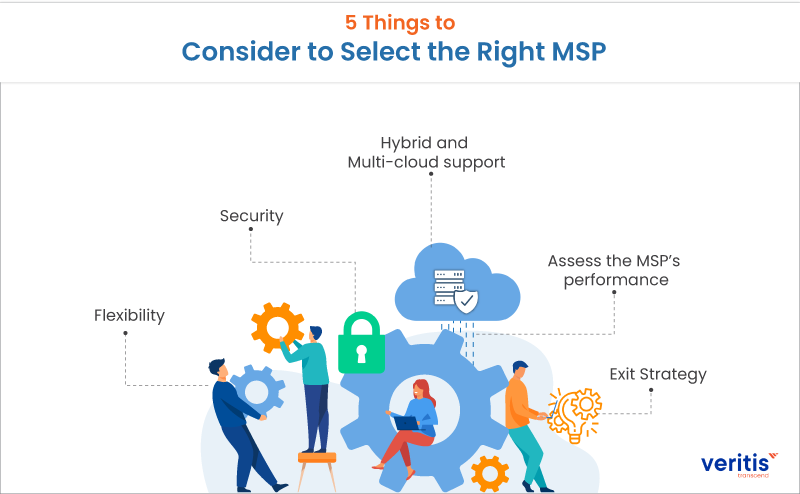
Managing various portfolios on the cloud has become a rather tedious thing. Although the companies previously managed their portfolios without external assistance, it is no longer the same as cloud computing has become quite advanced in the past decade.
Making leaps and bounds, cloud technologies are being ingrained with new features almost every fortnight. Although the cloud tech stays relevant with new features, it becomes rather arduous for the client to meander through the massive cloud.
This is where IT managed services providers have chipped. Managed IT services is now a lucrative area as clients have a plethora of needs that need to be optimized on the preferred cloud techs.
However, today’s fast-moving world demands one to make the right choice while choosing their IT managed services providers or MSPs.
Also Read: Why Managed Services? A Glance At Emergence, Present And Future!
So, how does one make the appropriate choice? Isn’t that a vexing question? It is pretty normal to be tense about this as the company’s future will be decided by deft the MSP is. To make things simpler for all, we have listed down the criteria that will help you decide the right partner for the managed IT services:
5 Things to Consider to Select the Right MSP

Flexibility
When migrating to the cloud, you enter an ironclad agreement with the MSP as to what all should be done. However, after the migration is done, you would often want to integrate some other features. As this is beyond the purview of the MSP, this results in additional expenses and a lot of wasted efforts. So instead, educate yourself as to what all you can integrate cloud with. This will be possible only when the MSP has enough diligence to educate you and go the extra mile.
For instance, Veritis took on a client who did not know how to exploit Kubernetes. The client also came forth with a requirement that it ought to be built on their existing infrastructure. Given their unique requirements, which would have been pricey on Windows infrastructure, the in-house experts built a cost-effective but reliable solution on the Linux ecosystem. This is the flexibility that a client must look for in an MSP, as requirements are not always set in stone.
Also Read: How Managed IT Services Help Industries ‘Scale-up’ Performance?
Security
Security is an aspect that should not be compromised upon in any way. When you approach the MSP, have them understand that security is a priority. It should be made amply clear that the MSP should not divulge any confidential data or anything that could threaten its stability. An MSP is good in this aspect if they have amassed a formidable track record in terms of client security and confidentiality.
Additionally, an MSP is good when armed with native security and fail-safe protocols to protect the cloud ecosystem from internal and external threats. The MSP’s pitched security strategies should also toe your compliance policies.
Hybrid and Multi-cloud Support
Gone are the days where the clients have one public cloud setup. The expanding needs of the world have paved the way for hybrid and multi-cloud setups. Although the concept of having the best of all worlds is enticing, it isn’t easy to manage various clouds as one requires a good foothold of all significant clouds. Although some prefer to rope in multiple MSPs, it would become cumbersome to coordinate with all of them. Instead, opt for an MSP who has forayed and stacked considerable experience in all the three clouds that move the markets.
Be it AWS, Azure, or Google Cloud; the MSP should be agile enough to cater to the clients’ needs. This trims down the coordination and communication snafus when one has decided to go with hybrid or multi-cloud strategies. If hiring multiple MSPs is Hobson’s choice, then know what all an MSP offers and supports. Based on the support information, you can make a well-founded decision as to who to go with.
Also Read: 9 Ways Managed IT Services Help Your Business (Infographic)
Assess the MSP’s Performance
Talent and knowledge never go to waste. If the MSP indeed has the caliber, then the company must have fared well over the years and should have the potential to grow. If the MSP shows promise to do better, that would only mean that the company will add more skills as it grows. You can also arrive at this decision if you know their roadmap. This will allow you to get their bearings as to how they have chosen to proceed.
Exit Strategy
A good MSP will have the exit strategy planned and penned. Given that there are many variables and unique clients’ needs, there is no assurance that the first MSP will be the best choice. One ought to take that into account and realize that there should be an exit strategy.
This approach is not to be confused with one having a foot out of the door. One must be pragmatic enough to realize that maintaining a cloud infrastructure is a business transaction, not a relationship. So, look for an MSP who already has a unified exit strategy and settle on that after due diligence.
Also Read: How Application Managed Services Help?
Capping it off

In today’s world, finding the right person for the job is a complex task. This is due to various reasons. But, your search ends at Veritis, an IT managed service provider with over a decade-long industry presence. Based out in Texas, we have built reliable and flexible solutions for a variety of clients. From Fortune 500 clients to enterprises, our clients have walked away with customized solutions based on their requirements and business goals.
Given our expertise in three significant clouds, AWS, Azure, and Google Cloud, we have the propensity to support clients of all shapes and sizes. So, collaborate with us and walk away with a solution that ushers you into the future.
More Articles:
- Managed IT Services for Law Firms: Importance and Benefits
- Managed IT Services To Be ‘USD 329 Bn’ Market by 2025
- Why ‘Managed IT Services’? Top-9 Reasons To Choose A ‘Managed IT Services’ Partner
- How to get the best results from your managed service provider?
- Outcome Matters: Measuring DevOps Success in 4 Ways!
